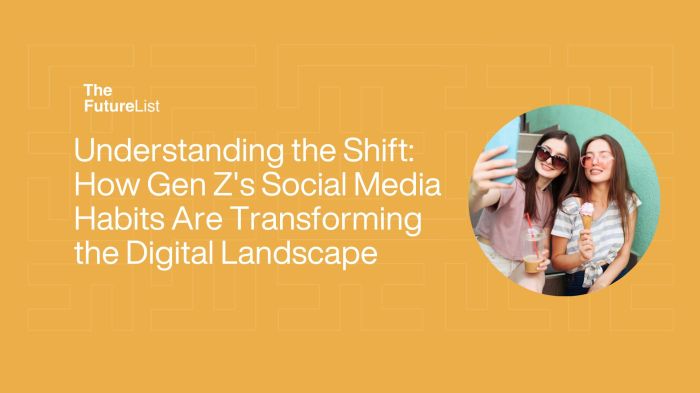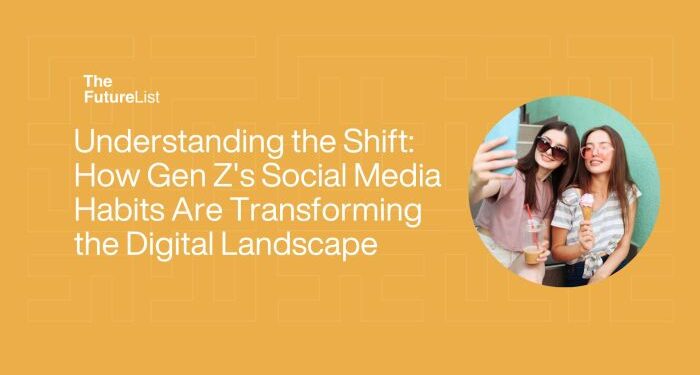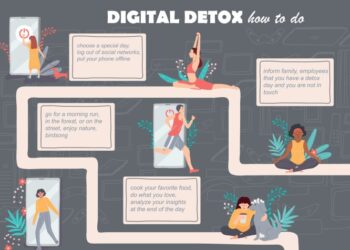In a world where technology plays a pivotal role, Gen Z is at the forefront of redefining digital lifestyle trends. From their unique use of digital tools to their influence on marketing strategies, this generation is reshaping the way we interact with the digital world.
Let's delve into how Gen Z is revolutionizing the way we perceive and engage with technology.
As we explore the impact of social media, digital consumption habits, and Gen Z's influence on marketing trends, it becomes evident that this generation is setting new standards in the digital landscape.
How Gen Z is Embracing Technology
Gen Z, the generation born between the mid-1990s and early 2010s, has fully embraced technology in all aspects of their lives. From communication to entertainment and social networking, Gen Z relies heavily on digital tools and platforms to navigate their daily routines and express their creativity and individuality.
Digital Tools and Platforms
Gen Z favors platforms like Instagram, TikTok, and Snapchat for social networking and self-expression. These platforms allow them to share photos, videos, and stories in real-time, connecting with peers and showcasing their unique personalities. Messaging apps like WhatsApp and Messenger are also popular among Gen Z for quick and easy communication.
Expressing Creativity and Individuality
Gen Z utilizes technology to create and share content that reflects their interests and values. They use platforms like YouTube to showcase their talents, whether it's through vlogs, music covers, or tutorials. Apps like Canva and Adobe Spark help them design visually appealing graphics and videos to stand out in a crowded digital space.
Integration into Daily Lives
From online shopping and streaming services to educational tools and fitness apps, Gen Z integrates technology seamlessly into various aspects of their daily lives. They rely on platforms like Spotify and Netflix for entertainment, Google Drive and Dropbox for productivity, and apps like Headspace for mental wellness.
Virtual events and online communities have also become a norm for Gen Z, especially in light of the COVID-19 pandemic.
Impact of Social Media on Gen Z
Social media plays a crucial role in shaping the digital lifestyle trends of Generation Z. This tech-savvy generation heavily relies on social media platforms for communication, entertainment, and information sharing.
Popular Social Media Platforms Among Gen Z
- Instagram: Gen Z gravitates towards Instagram for its visual appeal and storytelling features. They use this platform to showcase their creativity and connect with like-minded individuals.
- TikTok: Known for its short-form video content, TikTok has become a favorite among Gen Z. They enjoy the quick, engaging videos and the sense of community on the platform.
- Snapchat: Gen Z appreciates Snapchat's disappearing content and real-time communication features. It allows them to express themselves freely without the pressure of creating permanent posts.
Gen Z's Relationship with Social Media
- Instant Gratification: Social media has instilled a desire for instant gratification in Gen Z, influencing their behaviors and decision-making processes.
- Mental Health Impact: The constant use of social media has raised concerns about its impact on Gen Z's mental health, leading to issues like anxiety and low self-esteem.
- Activism and Awareness: Despite the drawbacks, social media has also empowered Gen Z to raise awareness about social issues and drive positive change through online activism.
Digital Consumption Habits of Gen Z
Gen Z has significantly altered the way digital content is consumed compared to older generations. Their preferences and habits have shifted towards digital streaming services, online shopping, and digital entertainment, marking a departure from traditional methods of consumption.
Shift towards Digital Streaming Services
- Gen Z prefers streaming services like Netflix, Hulu, and Disney+ over traditional television viewing.
- The convenience of on-demand content and the ability to customize viewing experiences appeal to Gen Z.
- They enjoy the freedom to watch their favorite shows anytime, anywhere, on multiple devices.
Online Shopping Trends
- Gen Z gravitates towards online shopping platforms like Amazon, ASOS, and Etsy for their retail needs.
- The ease of browsing, ordering, and receiving products at their doorstep resonates with Gen Z's digital lifestyle.
- They value the vast selection, competitive pricing, and personalized recommendations offered by online retailers.
Preference for Digital Entertainment
- Gen Z consumes a significant amount of digital entertainment content on platforms like YouTube, TikTok, and Instagram.
- Short-form video content and user-generated media are particularly popular among Gen Z audiences.
- They engage with influencers, content creators, and online communities to stay entertained and informed.
Gen Z's Influence on Digital Marketing Trends
Gen Z's digital behaviors and preferences are significantly impacting the way companies approach marketing strategies. This generation, born between 1997 and 2012, has grown up in a digital world and expects brands to engage with them in authentic and meaningful ways.
Importance of Authenticity, Transparency, and Social Causes
Marketing to Gen Z requires a focus on authenticity, transparency, and social causes. This generation values honesty and genuineness, and they can easily spot inauthentic marketing tactics. Brands that are transparent about their values and practices are more likely to gain the trust of Gen Z consumers.
- Authenticity: Gen Z appreciates brands that are genuine and true to their values. They are more likely to support companies that are honest and transparent in their marketing efforts.
- Transparency: Being open and transparent about products, pricing, and business practices is crucial when targeting Gen Z. They value honesty and expect brands to be upfront about their operations.
- Social Causes: Gen Z is passionate about social issues and expects the brands they support to take a stand on important causes. Marketing campaigns that align with social causes resonate well with this generation.
Key Characteristics of Successful Digital Marketing Campaigns
Successful digital marketing campaigns targeting Gen Z share certain key characteristics that appeal to this tech-savvy and socially conscious generation.
- Engagement: Interactive and engaging content is crucial when targeting Gen Z. They prefer content that allows them to participate and connect with the brand.
- Personalization: Gen Z values personalized experiences and expects brands to tailor their marketing efforts to individual preferences and interests.
- Visual Content: Visual platforms like Instagram and TikTok are popular among Gen Z, making visual content essential for successful marketing campaigns targeting this generation.
- Mobile Optimization: Gen Z is heavily reliant on mobile devices for browsing and shopping, so ensuring that marketing campaigns are optimized for mobile is key to reaching this audience effectively.
Outcome Summary

Gen Z's innovative approach to technology and digital content is not just a trend but a societal shift that is here to stay. Their ability to adapt, create, and consume digital content is shaping the future of technology and marketing.
The way Gen Z embraces digital lifestyle trends serves as a reflection of their evolving needs and aspirations, paving the way for a new era of digital engagement.
Quick FAQs
How does Gen Z differ in their use of digital tools compared to older generations?
Gen Z tends to favor platforms that offer instant communication and visual content, such as Snapchat and TikTok, reflecting their preference for quick and engaging interactions.
What role does social media play in shaping Gen Z's digital lifestyle trends?
Social media platforms serve as a key avenue for self-expression and connection for Gen Z, influencing their behaviors, preferences, and even purchasing decisions.
Why is authenticity important in digital marketing campaigns targeting Gen Z?
Gen Z values authenticity and transparency in brand communication, gravitating towards brands that align with their values and social causes.







